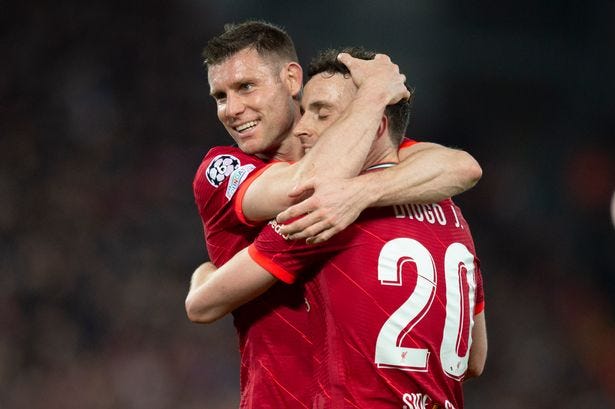The Number 20, the Man, and the Memory: James Milner’s Lasting Tribute to Diogo Jota
James Milner switches to number 20 at Brighton in tribute to Diogo Jota.
It was the sort of quiet gesture that carried the weight of a thousand words. No press conference, no grand unveiling, just a number stitched on the back of a shirt and a man with years in his legs doing what he has always done best. James Milner has chosen to wear the number 20 shirt at Brighton & Hove Albion this season, not for style, not for ego, but as a heartfelt tribute to Diogo Jota, his former Liverpool teammate and friend.
Jota’s death in early July sent a wave of grief through football. Only 28 years of age, taken in a cruel twist of fate while travelling with his brother André in northern Spain. They had been heading back to England, ferry-bound and future-facing, only for life to intervene with tragedy. It left Liverpool, Portugal, and football lovers the world over stunned. The Premier League had just been won. There were medals to celebrate, shirts to swap, and stories yet to be written. Instead, there was silence. A deep, aching silence.
At a time like that, the gestures that matter most are the simplest ones. And Milner, never a man for frills or fanfare, let his actions speak.
He could have kept the number 6 he had worn at Brighton since leaving Anfield in 2023. He had every right to. But when Carlos Baleba switched his own shirt to 17 for the upcoming season, freeing up 20, Milner saw the opportunity. He saw it not as a new number, but as a continuation of something far more meaningful.
"Once I heard Carlos was looking to change his number and 20 was available, I wanted to do it as a mark of respect and pay tribute to Diogo Jota," Milner explained through Brighton’s official channel. "He was an amazing player who I was fortunate to play with and a great friend as well. It will be a great honour to wear his number in the Premier League this year."
There was no mistaking the emotion behind the words. This was not a publicity stunt. This was a 39-year-old man who had spent decades in dressing rooms, who knew the value of true camaraderie and who had felt the gut-punch of losing someone before their time. Milner had stood beside Jota for three years at Liverpool. They had shared a pitch, a dressing room, celebrations and setbacks. More than that, they had shared humour and mischief, and a mutual respect that ran deep.
The footballing world moves fast, often too fast. Players come and go, and tributes can sometimes feel fleeting. But this gesture carries permanence. Every time Milner steps onto the pitch this season, the number 20 will walk with him. Not just on his back, but in his mind, in his heart, and in every sideways pass, every last-ditch tackle, and every lung-bursting run into the corner. It is how Milner plays. Always has.
The number 20 shirt is no longer available at Anfield. Liverpool, in a decision as dignified as it was powerful, chose to retire the number in Jota’s honour. For five seasons, it had been his. He had worn it with distinction, arriving from Wolves and quickly becoming a vital part of Jurgen Klopp’s attacking ensemble. And when Arne Slot led Liverpool to the Premier League title in May, Jota had been there, right in the thick of it, finishing chances, pressing high, and playing with that blend of grit and guile that made him so beloved.
So the number needed a new custodian, somewhere in the game where it could continue to matter. Milner, now into his fortieth year and still as committed as ever, was the perfect man. If anyone can carry that shirt with the right spirit, it is him.
Milner’s legacy in English football is already etched in granite. With 638 Premier League appearances to his name and Gareth Barry’s all-time record of 653 in sight, he is the living embodiment of consistency. But longevity alone is not what defines him. It is the manner in which he has gone about his work. Professional to the point of obsession. Reliable when others fell short. And, crucially, grounded.
He flew to Portugal in July to attend Jota’s funeral, joined by the likes of Jordan Henderson and a host of past and present Liverpool players. It was not a duty, it was a devotion. Hours after Jota’s passing, Milner had posted on Instagram, his words laced with sadness and memory.
“Devastated for the loss of Diogo and André. Absolutely loved sharing a dressing room with him, having so many laughs together, constantly winding each other up with our stubborn nature and truly marvelling at the stuff he did on the football pitch.”
That is the sort of tribute you cannot script. It is lived-in. Real.
This season, Brighton supporters will see a veteran playing on borrowed time, still going strong while the sands run low. What they might not fully grasp, though, is the deeper story behind the number on his back. Milner is not simply prolonging a career, he is carrying a memory. Every match will be a tribute. Quietly, respectfully, powerfully.
Football, for all its money and mayhem, still finds space for these moments. And it matters that it does. It matters that amidst the circus of pre-season tours, kit launches and transfer sagas, there are still players who remember what this game is really about. People. Friendships. Bonds formed in dugouts and dressing rooms. And the duty we owe to those who can no longer pull on the shirt themselves.
Milner will not talk about this endlessly. He will not bask in the attention. He never has. But as the season unfolds, there will be moments when he turns, arms outstretched in celebration, the number 20 flickering under the floodlights. And those who knew Jota, who watched him play, who cheered his goals, will know.
This is for him.
Well played, James Milner. And rest easy, Diogo.



